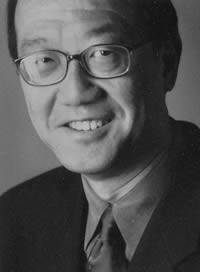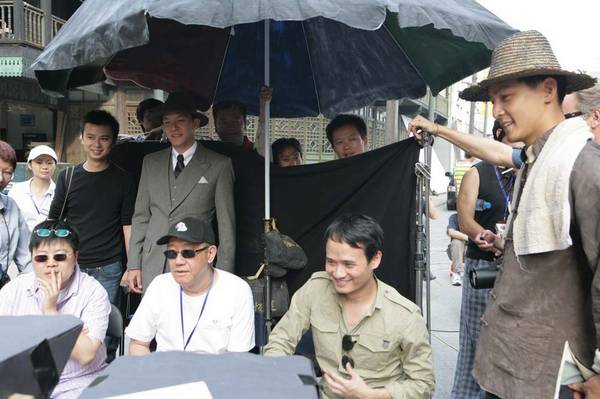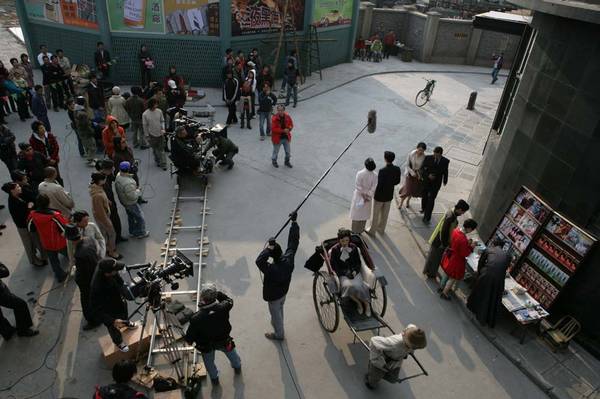 |
Statistics :
11630 Movies
19215 People
1448 Studios
29 Articles
73 Interviews
12 DVD Reviews
32452 Screenshots
3722 Videos
|
|
 |
|
|

|
 Terence Chang is like a guardian angel to John Woo. For the past three decades, not only he has been Woo’s producer and business partner but also his enabler, his promoter, his good friend and number-one fan. The 61-year old producer has stuck by the ‘God of Action’ through thick and thin, in Hong Kong, in the US and in China, helping Woo’s career reaching the heights we all know. What’s less known is Chang’s résumé. Terence Chang is like a guardian angel to John Woo. For the past three decades, not only he has been Woo’s producer and business partner but also his enabler, his promoter, his good friend and number-one fan. The 61-year old producer has stuck by the ‘God of Action’ through thick and thin, in Hong Kong, in the US and in China, helping Woo’s career reaching the heights we all know. What’s less known is Chang’s résumé.
Chang (Chang Chia Tsun in Chinese) was born in 1949 in Hong Kong. As a student he was already moving around; He studied architecture at the University of Oregon and cinema at the University of New York. Back to the Far East, he entered the Hong Kong film industry in the 1970s joining the studio whose productions made Bruce Lee an international action icon, Golden Harvest.
At Golden Harvest, Chang was busy re-editing and updating films to match the local audience taste. That’s when he met John Woo for the first time. Then, Woo was a successful director not for action flicks, but for silly comedies he churned out with disillusions. Woo couldn’t stand the very films he was making (see our interview with John Woo) and Chang understood this. But they went their separate ways.
Chang worked a few years in marketing and sales departments for a local TV station and a film company. In 1986, he became an executive in Tsui Hark’s film company, the Film Workshop. There, he and Woo met again and decided to collaborate. Together, they started making more meaningful films: The influential A Better Tomorrow and its sequel.
After some backstabbing from Tsui Hark regarding the third opus of the successful franchise, Chang and Woo decided to leave the Tsui’s clan. They founded Milestone Pictures and produced three box office hits with Chow Yun-fat: Once a Thief; Hard Boiled; and Now You See Love, Now You Don’t.
Early 1990’s, with the threat of the 1997 handover looming, Woo and Chang relocated in Hollywood. They were followed by a great many Hong Kong talents, such as Michelle Yeoh, Kirk Wong, Ronny Yu and Chow Yun-fat.
Since then, Chang has been busy launching and managing all the Hong Kong celebrities relocating to the US (more than a trend, it was like a haemorrhage).
For instance, it was Chang who helped launch Chow Yun-fat’s American career in the early 1990s. It was him who organized retrospectives with Chow’s films all around North America, him who introduced Chow to the most prestigious Hollywood talent agency William Morris Agency, him who negotiated film contracts (Anna and the King, The Replacement Killer) and him who developed scripts especially for Chow (X-LA, Charlie Apana and Lost in Translation).
Chang has been even more dedicated to John Woo’s career, as an advisor, a producer and a friend. He supported the "Master of Excess" in all his artistic decisions. The odd couple conquered the Hong Kong and Hollywood box offices. In 2007, it was time to bring back home all the filmmaking expertise they accumulated over the years. They made one the most expensive period epics ever made in China, Red Cliff.
Chang shares below first-hand insights on Woo’s career and personality, and sheds light on their relationship. |

|
 Terence Chang (second left) on the set of Blood Brothersby Alexi Tan. Alexi Tan (M), Daniel Wu (R).
Terence Chang (second left) on the set of Blood Brothersby Alexi Tan. Alexi Tan (M), Daniel Wu (R). |
 HKCinemagic: You’ve worked with John Woo since The Killer. How Woo’s filmmaking has evolved from his Film Workshop period in Hong Kong to his Hollywood venture? HKCinemagic: You’ve worked with John Woo since The Killer. How Woo’s filmmaking has evolved from his Film Workshop period in Hong Kong to his Hollywood venture? |
Terence Chang: I first worked with John Woo on a Golden Harvest comedy called Long Time No See in 1979. I was fresh out of college and was a production manager, and he was a big comedy director. But one day before principal photography, John had a big fight with the studio, over casting; and the studio cancelled the picture. So [actually] I saw John through his first three phases of filmmaking: the Golden Harvest comedy period, the Film Workshop/Milestone "heroic bloodshed" period, and his Hollywood period.
In his first phase, he cleverly borrowed other people's elements and used them in his films. You can see traces of Chaplin, Keaton, Neil Simon, or even Spy Vs. Spy in his comedies. In his second phase, he dug into his own emotions to portray those characters, whether they are cops or gangsters. Like him, his heroes' motivations are always noble, but their action is always misunderstood by people. This is the period where he really matured as a filmmaker, even though his technique might not be as slick as his later Hollywood works. His best works are always about people, and the drama surrounding them. His themes are mostly about friendship, loyalty, dignity, honour, and betrayal.
In Hollywood, it saddens me to hear people referring him as an "action director." John Ford and Howard Hawks were never called that, even though they had made the best action films ever. True, in the beginning, John had to pay his dues, with assignments like Hard Target or Broken Arrow. He not only had to struggle with a foreign language, but also a foreign culture. So he was relying on one thing that has no language/cultural barrier, action. But throughout the years, he was extremely hard-working, and was fortunate to have worked with really professional crew. Technically, he is really a master of the craft of filmmaking. Later, he tried not to be totally conformed by the Hollywood studios, and to bring in his own personal style and theme into his American films. Sometimes he succeeded (Face/Off), but sometimes less so. His heart was totally behind Windtalkers; but like his hero John Enders, this film was misunderstood by the majority of people. |
| |
 HKCinemagic: What changes surprised you most? HKCinemagic: What changes surprised you most? |
| Terence Chang: He had learned more discipline since he came to the US. This surprised me. In Hong Kong, he was also a master of ‘Excess.’ He most often shot without a script. Not to mention storyboards. He didn't feel it was necessary to communicate his ideas with anyone. On his last couple of HK films (Once a Thief and Hard Boiled), not even the AD (Assistant Director) would know what would be his next setup. Often he would shoot enough footage for two films. You can imagine how difficult my job as a producer was. But everything changed since he came to Hollywood. He is getting more mature and responsible as a filmmaker, and as a person. |
| |
 HKCinemagic: You and Woo are probably the only HK filmmakers who conquered Hollywood, made A-class films appreciated in the West and didn’t return empty-handed to HK. Some other filmmakers have not been so lucky (Tsui Hark, Ringo Lam, Kirk Wong, etc.) How do you explain this success? HKCinemagic: You and Woo are probably the only HK filmmakers who conquered Hollywood, made A-class films appreciated in the West and didn’t return empty-handed to HK. Some other filmmakers have not been so lucky (Tsui Hark, Ringo Lam, Kirk Wong, etc.) How do you explain this success? |
Terence Chang: John uprooted his family and moved to L.A. in April 1992, months before Hard Target was greenlit. For him, there was no turning back. Hard Target was a moderate success. In the two years afterwards, he was attached to a couple of projects, but none of them got made for one reason or another. But he did not go back to Hong Kong, and won't even allow me to go back. We stayed in L.A., played the system, and stuck it out. I guess the other Hong Kong directors did not have that kind of stamina or patience.

A movie set. Here, the set of Blood Brothers in Shanghai, a film produced by Terence Chang.
|
| |
 HKCinemagic: Can you talk about John Woo’s huge creativity and especially how it was restricted and freed respectively in HK and in Hollywood? HKCinemagic: Can you talk about John Woo’s huge creativity and especially how it was restricted and freed respectively in HK and in Hollywood? |
| Terence Chang: I did not think John's creativity was in any ways restricted in Hong Kong, except that he was not allowed to make dramatic films in his Golden Harvest days. When he was working for Golden Princess (which financed the films of Film Workshop and Milestone Pictures then), the bosses were not allowed to see one frame of footage until John had finished his cut. In Hollywood, that was a whole different ballgame. Studio executives, many of whom had no knowledge of film, often imposed his or her own personal idea on John, in order to justify his/her own existence. There are constant battles and politics that we had to deal with, and that was tiring. |
| |
 HKCinemagic: Woo has so many projects in the pipeline, do you encourage him to have as many projects as possible or on the contrary do you help him to focus on just a few? HKCinemagic: Woo has so many projects in the pipeline, do you encourage him to have as many projects as possible or on the contrary do you help him to focus on just a few? |
| Terence Chang: John does not have that many projects in the pipeline [Ed.: As of March 2007]. Films that he was no longer attached to, like Spy Hunter or Rainbow Six, are films that I don't think he should be making, even though they might turn out to be huge box office hits. He should be making the films because he feels for the stories, and not because he wants to buy a few more houses. Right now, he is only attached to three, Red Cliff, an untitled US film to be shot in China, and my favourite, The Divide, about the people who built the Trans-Continental Railway. |
|
|
| |
 |
|
|
Page :
1
Top
|
|
|
|
|
|
|
 |
